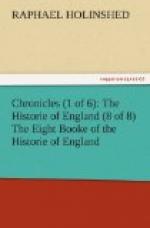* * * * *
AN APPENDIX TO THE FORMER CHAPTER.
[Sidenote: Bale] After Bardus, the Celts (as Bale saith) loathing the streict ordinances of their ancient kings, and betaking themselues to pleasure and idlenesse, were in short time, and with small labour brought vnder the subiection of the giant Albion, the sonne of Neptune, who altering the state of things in this Iland, streicted the name of Celtica and the Celts within the bounds of Gallia, from whence they came first to inhabit this land vnder the conduct of Samothes, as before ye haue heard, accordinglie as Annius [Sidenote: Annius.] hath gathered out of Berosus the Chaldean, who therein agreeth also with [Sidenote: Theophilus.] the scripture, the saieng of Theophilus the doctor, and the generall consent of all writers, which fullie consent, that the first inhabitants of this Ile came out of the parties of Gallia, although some of them dissent about the time and maner of their comming. Sir Brian Tuke [Sidenote: Sir Brian Tuke.] thinketh it to be ment of the arriuall of Brute, when he came out of [Sidenote: Caesar.] those countries into this Ile. Caesar and Tacitus seeme to be of opinion, that those Celts which first inhabited here, came ouer to view the [Sidenote: Tacitus. Bodinus.] countrie for trade of merchandize. Bodinus would haue them to come in (a Gods name) from Languedoc, and so to name this land Albion, of a citie in [Sidenote: Beda. Polydor.] Languedoc named Albie. Beda, and likewise Polydore (who followeth him) affirme that they came from the coasts of Armorica, which is now called little Britaine.
But that the authorities afore recited are sufficient to proue the time that this Iland was first inhabited by the Celts, the old possessors of Gallia; not onelie the neernesse of the regions, but the congruence of languages, two great arguments of originals doo fullie confirme [Sidenote: Bodinus.] the same. Bodinus writeth vpon report, that the British and Celtike language was all one. But whether that be true or not, I am not able to affirme, bicause the Celtike toong is long sithens growne wholie out of vse. Howbeit some such Celtike words as remaine in the writings of old authours may be perceiued to agree with the Welsh toong, being the [Sidenote: Pausanias] vncorrupted speech of the ancient Britains. In deed Pausanias the Grecian maketh mention how the Celts in their language called a horsse Marc: and by that name doo the Welshmen call a horsse to this day: and the word Trimarc in Pausanias, signifieth in the Celtike toong, three horsses.
Thus it appeared by the authoritie of writers, by situation of place, and by affinitie of language, that this Iland was first found and inhabited by the Celts, that there name from Samothes to Albion continued here the space of 310 yeares or there abouts. And finallie it is likelie, [Sidenote: Iohn Bale.] that aswell the progenie as the speech of them is partlie remaining in this Ile among the inhabitants, and speciallie the British, euen vnto this day.




